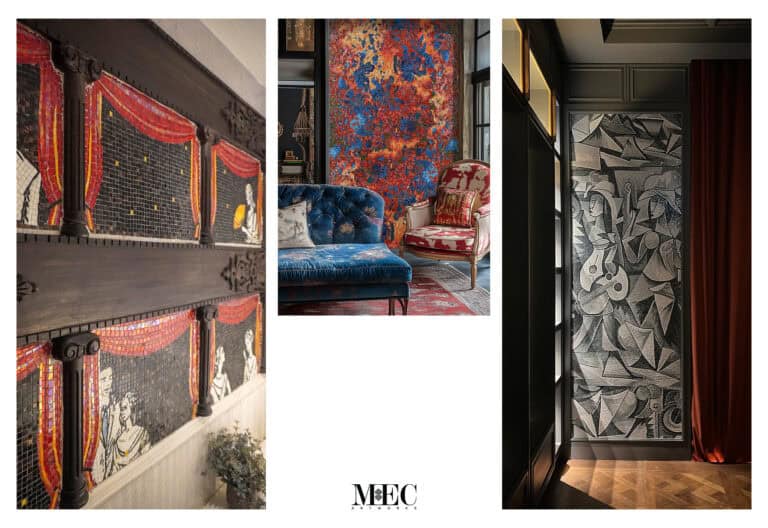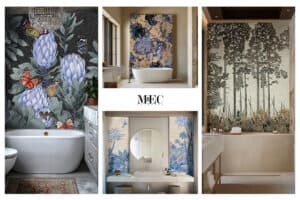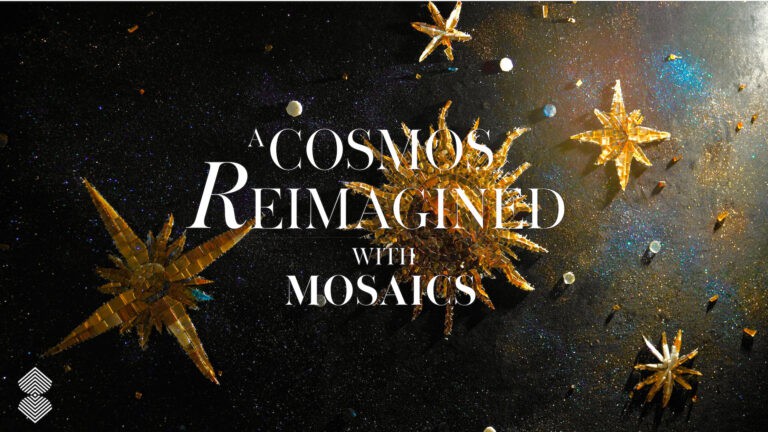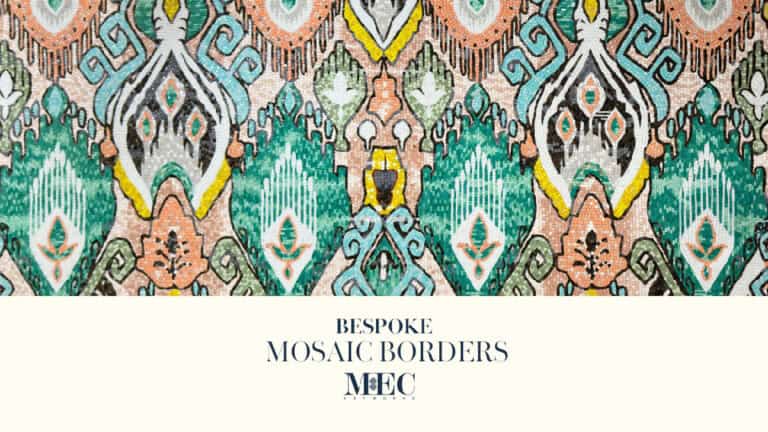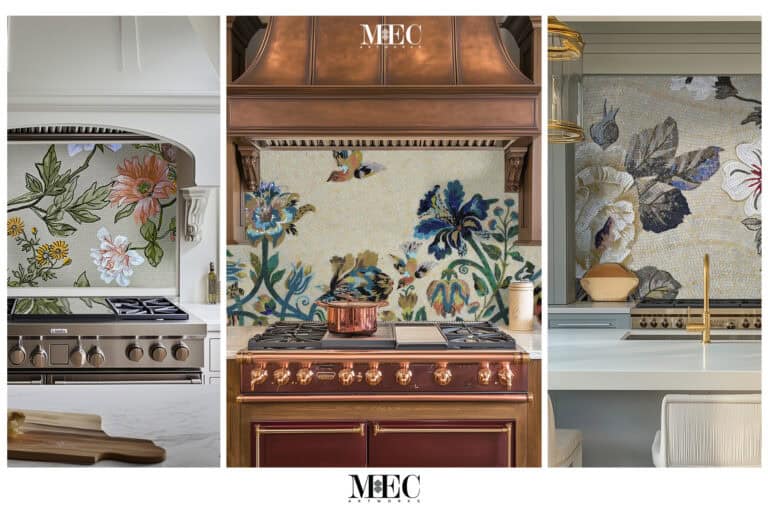In a world of fast-paced trends and mass production, there is a quiet resurgence of something timeless and soulful – handmade mosaics. These intricate artworks, composed of carefully placed handmade mosaic tiles, are more than just beautiful compositions. They are fragments of feeling, emotion, and identity expressed in color and form.
Whether it’s an evocative accent wall or a symbolic floor design, handmade mosaic art patterns have the unique ability to connect deeply with people. They whisper stories, carry memories, and stir emotions that mere paint or wallpaper could never replicate. At MEC Artworks, we understand this emotional language. Our team of artisans transforms tile and vision into immersive storytelling, making your space not only stylish but soul-stirring.
Table of Contents
- The Enduring Craft of Handmade Mosaic Art
- The Psychology of Pattern in Handmade Mosaic Art
- Designing With Emotions: Why People Connect With Handmade Mosaics
- Trendy Mosaic Designs for Modern Interiors
- Incorporating Handmade Mosaic Tiles in Every Space
- Reviving Ancient Wisdom in Modern Spaces
- Embracing Decorative Mosaic Art in Commercial Design
- How Mosaic Art Enhances Brand Identity
- Connecting Through the Creation of Emotional Impact with Vivid Colors Mosaic
- Why Emotion Is the Invisible Thread That Connects Us to Art
- Our Creative Process at MEC Artworks
- Why Designers Love Mosaic Art
- Mosaic Art and the Future of Interior Design
- Sustainability and the Handmade Ethos
- Turn Your Space Into a Story With Handmade Mosaics
- FAQs
The Enduring Craft of Handmade Mosaic Art
What makes handmade mosaics so emotionally powerful? The secret lies in the process. Each piece starts with a vision – a spark of inspiration. This is followed by the labor – intensive yet deeply rewarding work of selecting, cutting, and arranging handmade mosaic tiles.
The human touch behind each mosaic ensures individuality. No two pieces are identical. Every pattern has intent. Every tile placement contributes to the emotion of the final piece.
- Materials Matter: We use high-quality ceramics, natural stones, glass, and even metallic elements.
- Hand – Crafted Precision: Unlike machine-made designs, our mosaics reflect artistic intuition and personal sensitivity.
- Layered Storytelling: Our pieces often carry cultural, natural, or abstract themes, allowing deep connection with the observer.
This craftsmanship results in decorative mosaic art that feels alive—an artwork that speaks not only through visual appeal but also through emotional resonance.
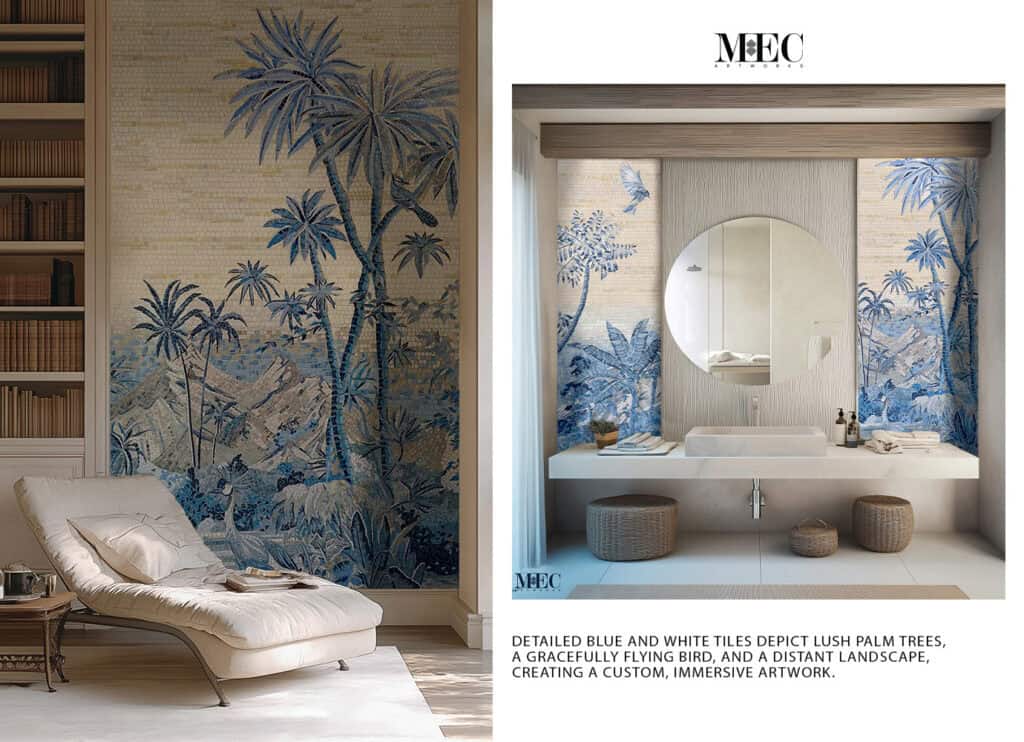
The Psychology of Pattern in Handmade Mosaic Art
While color plays a dominant role in visual storytelling, the emotional depth of handmade mosaic art patterns is also rooted in shape and rhythm. Repeating patterns – whether geometric or organic – have a profound psychological impact on how we feel within a space.
Circular and spiral designs, for example, evoke calm, wholeness, and a sense of continuity. Angular or triangular patterns bring dynamism and energy. When artists arrange handmade mosaic tiles and borders with mindful repetition, they don’t just build a design – they craft emotional resonance.
This is especially powerful in therapeutic or mindfulness spaces, where pattern influences state of mind. Think of a meditation room adorned with gentle, wave-like tiles. The repetitive motion of the eye moving across the design mimics breathwork, subtly encouraging calm and presence. Interior designers have started intentionally using these patterns to shape emotional energy in both residential and commercial interiors.
Designing With Emotions: Why People Connect With Handmade Mosaics
When you walk into a room and are greeted by a sweeping floral pattern on the floor or an abstract burst of color on the wall, it does more than catch your eye – it touches your heart. The beauty of handmade mosaic art patterns is that they connect emotionally, often subconsciously, with those who see them.
Here’s why:
- Color Psychology: Mosaics use color with intention. Warm tones evoke comfort and intimacy, while cool hues bring calm.
- Symbolism: Many designs integrate symbols and motifs from different cultures, offering spiritual or emotional depth.
- Textural Feel: The texture of handmade mosaic tiles invites touch and interaction, deepening the connection.
- Memory Triggers: Certain patterns and colors can evoke personal or cultural memories, creating instant nostalgia.
- Organic Flow: Handmade mosaics often feature irregularities that mirror nature’s imperfections, making them more relatable.
- Artisanal Presence: Knowing a human hand placed each tile adds emotional value and a sense of intimacy.
In a world driven by digital flatness, these tactile, colorful designs remind us of humanity, imperfections, and the beauty of detail.
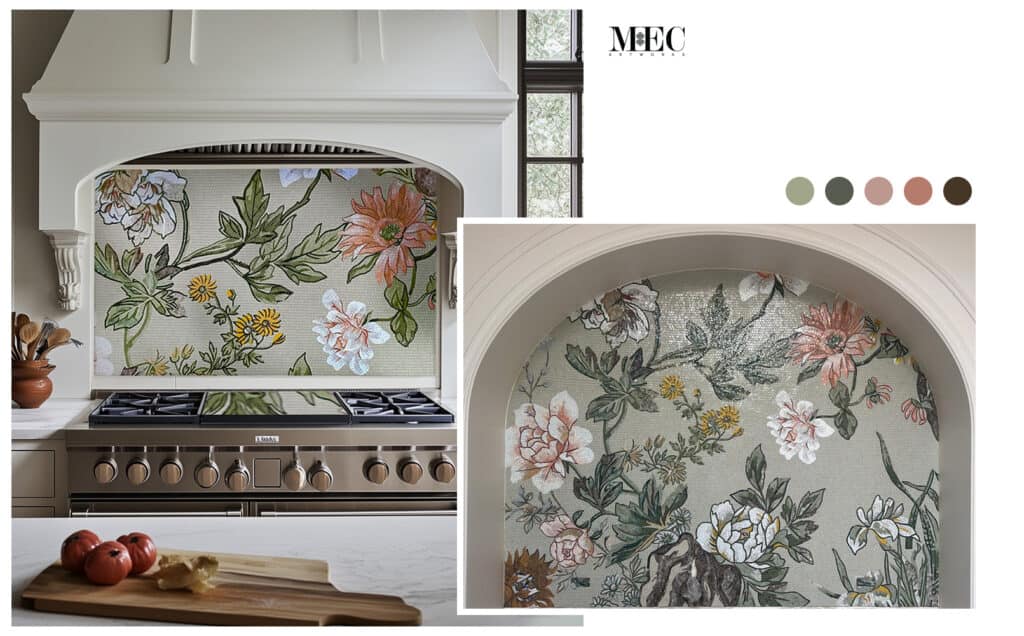
Trendy Mosaic Designs for Modern Interiors
One common misconception is that mosaic art only fits traditional or ancient styles. In reality, cool mosaic designs are revolutionizing modern interiors. At MEC Artworks, we help clients design custom pieces that fit both classic and contemporary aesthetics.
Here are some examples of how handmade mosaics fit into modern-day designs:
- Monochromatic Minimalism: Black and white mosaics form geometric or abstract patterns for a sleek, modern look.
- Nature-Inspired Murals: Use earthy tones and organic patterns to evoke the outdoors inside your home or office.
- Metallic Glam: Infuse gold, silver, or copper tones into mosaic tile designs for a touch of luxury.
- Vintage Revival: Retro-inspired mosaic patterns bring nostalgic charm with vibrant colors and classic shapes.
- Bold Color Blocking: Bright, contrasting tiles arranged in large blocks create energetic focal points in any space.
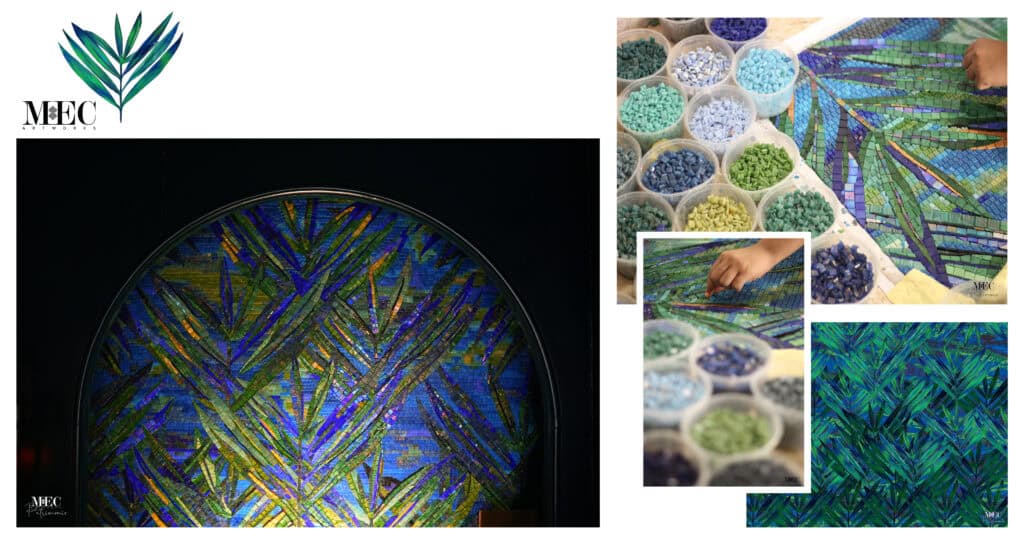
Incorporating Handmade Mosaic Tiles in Every Space
The versatility of handmade mosaic tiles allows them to enhance almost any room. Whether you’re renovating a home or designing a commercial space, the possibilities are endless.
Here’s how different spaces come alive with mosaic art:
1. Living Rooms
- Mosaic Tile Accent Wall Ideas: A statement wall behind the sofa with waves of color and movement.
- Fireplace Surrounds: Artistic tiling that turns your fireplace into the visual centerpiece of the room.
2. Kitchens
- Backsplashes: Add personality and color above the counters with custom, food-inspired themes.
- Floor Borders: Use decorative tiles as outlines or transitions between different zones.
- Kitchen Islands: Showcase the exquisite appeal of you kitchen by installing decorative mosaics on the front and sides of your kitchen island counter.
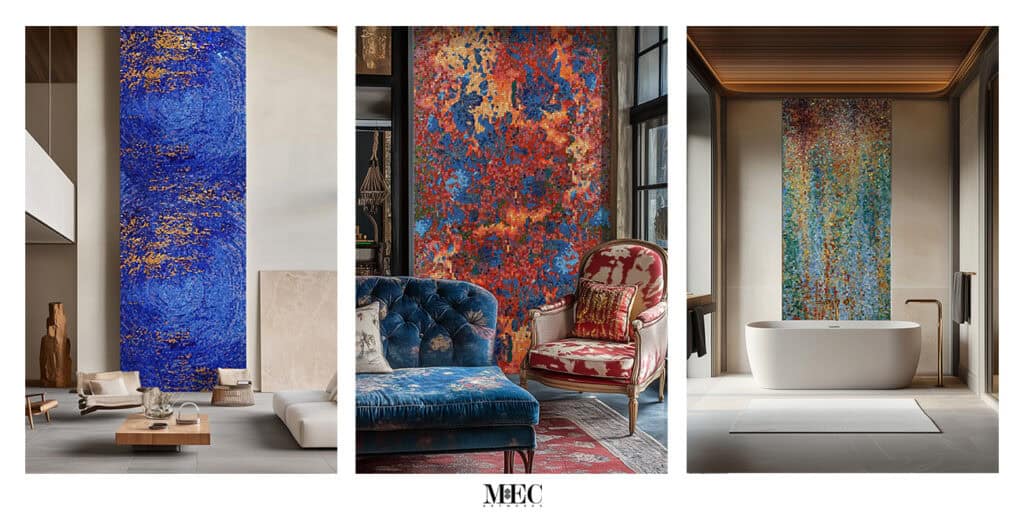
3. Bathrooms
- Shower Niches: Intricate patterns turn a functional space into a calming oasis.
- Vanity Backdrops: Add shimmer and elegance behind mirrors and sinks.
4. Outdoor Spaces
- Garden Pathways: Durable, weather-resistant handmade mosaic flooring for artistic walkways.
- Patio Walls: Aesthetic mosaic art for exterior walls adds charm and value.
Reviving Ancient Wisdom in Modern Spaces
Mosaic art is not a modern invention. It is a legacy that spans cultures, continents, and centuries. Ancient Romans, Greeks, and Islamic civilizations used mosaics to depict gods, myths, and sacred geometry. By reintroducing these motifs in today’s designs, handmade mosaics connect contemporary spaces with the wisdom and beauty of the past.
This revival is more than stylistic. It is emotional and symbolic. Imagine walking barefoot across a handmade mosaic flooring inspired by a Byzantine chapel or gazing upon a wall that draws from Moorish tilework. These designs invite reflection, awe, and appreciation of history’s artistry. They offer grounding and a powerful antidote to the transience of modern digital design.
In corporate lobbies or cultural centers, these historical references anchor a space. They build a narrative, linking the old with the new. At MEC Artworks, we often collaborate with clients who want their interiors to reflect lineage, tradition, or homage to heritage. Mosaic is the perfect medium for that dialogue.
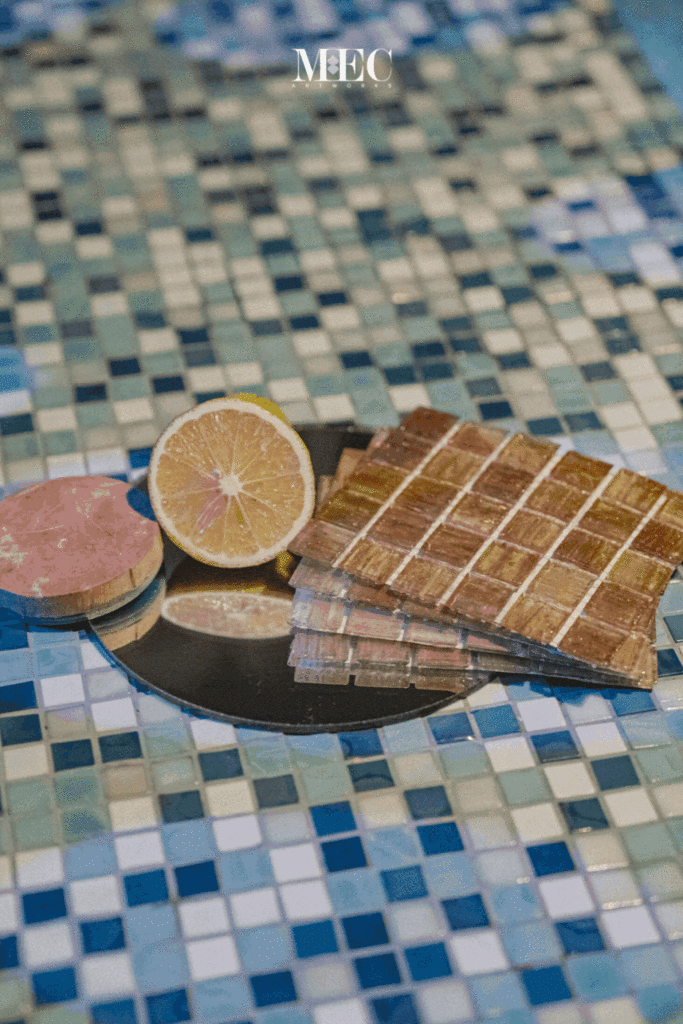
Embracing Decorative Mosaic Art in Commercial Design
Businesses and public spaces are turning to decorative mosaic art to express brand values and enhance customer experience.
For example:
- Hotels use large-scale mural installations in lobbies to welcome guests with local flavor.
- Restaurants incorporate thematic handmade mosaic tiles on walls and floors to build ambiance.
- Wellness centers feature calming, water-inspired patterns in lounges and spas to promote relaxation.
These spaces benefit from the emotional resonance and memorable experiences that mosaics provide. A beautiful mosaic is not just art—it becomes part of the story that clients and visitors remember.
How Mosaic Art Enhances Brand Identity
Art has become a major tool in branding. Today, companies aren’t just marketing products—they’re marketing experiences, values, and identities. Decorative mosaic art especially inspired by nature allows brands to physically express who they are, especially in curated environments such as boutique hotels, flagship stores, and offices.
Mosaics tell stories in texture. A startup might use abstract, colorful handmade mosaic tiles to reflect innovation and youth. A heritage brand could commission a classical pattern to express timeless quality. Wellness brands benefit from nature-inspired patterns that evoke balance and serenity.
In each case, the goal is emotional consistency. The mosaic becomes part of the client journey, making the space memorable and on-brand. It creates a tactile memory that digital media cannot replicate. This strategic integration of art into business settings is increasingly popular among interior designers looking to build immersive spaces with lasting impact.
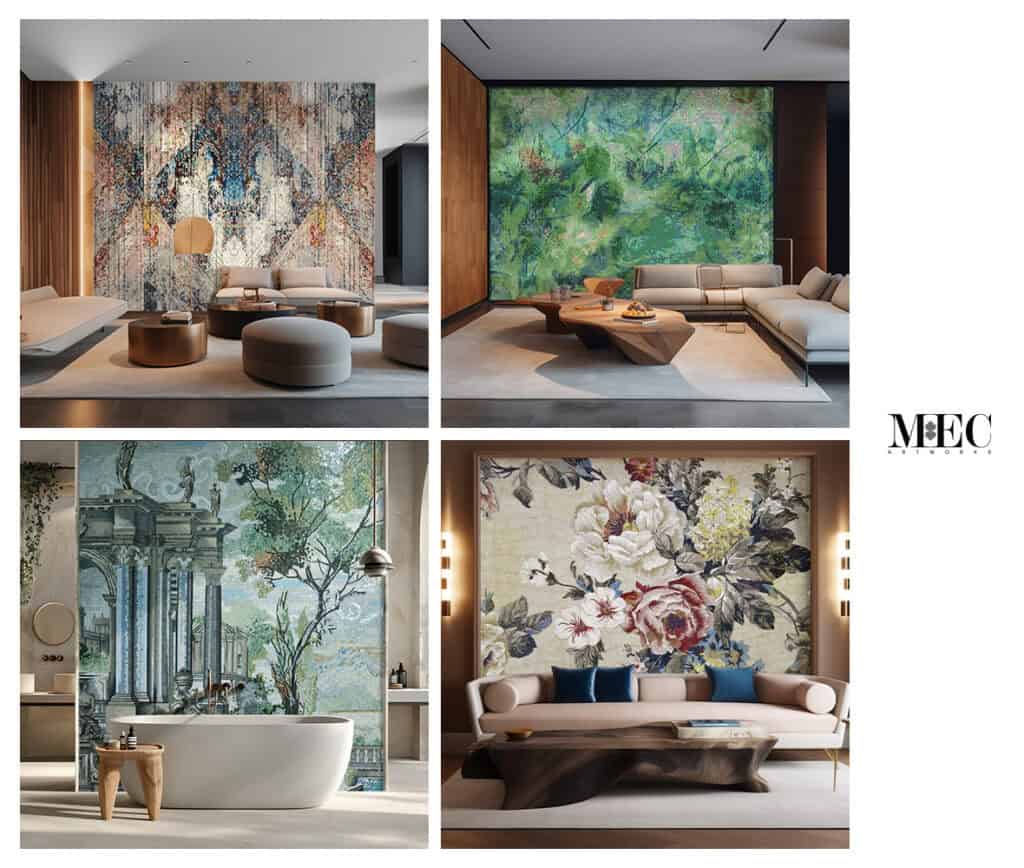
Connecting Through the Creation of Emotional Impact with Vivid Colors Mosaic
Let’s return to our central idea: the creation of emotional impact with vivid colors mosaic. Color is a universal language, and mosaics harness this language powerfully. The psychology of colors in mosaic design plays a crucial role in shaping how we experience a space. With carefully chosen palettes, mosaic artists can:
- Communicate Joy: Bright yellows and oranges spark optimism, perfect for children’s and creative spaces.
- Express Tranquility: Soft blues and greens bring calm, ideal for spas, bathrooms, and wellness areas.
- Inspire Reflection: Deep purples, grays, and metallics create thoughtful moods in meditation or library zones.
- Evoke Warmth: Earthy reds and browns foster comfort, great for living and gathering rooms.
- Stimulate Creativity: Bold blues and vibrant greens boost focus in workspaces and studios.
- Encourage Balance: Neutrals with subtle color accents offer harmony for varied interior styles.
At MEC Artworks, our focus is not only on creating beautiful designs but also on ensuring that those designs emotionally engage. This makes every project a truly personal experience for our clients.
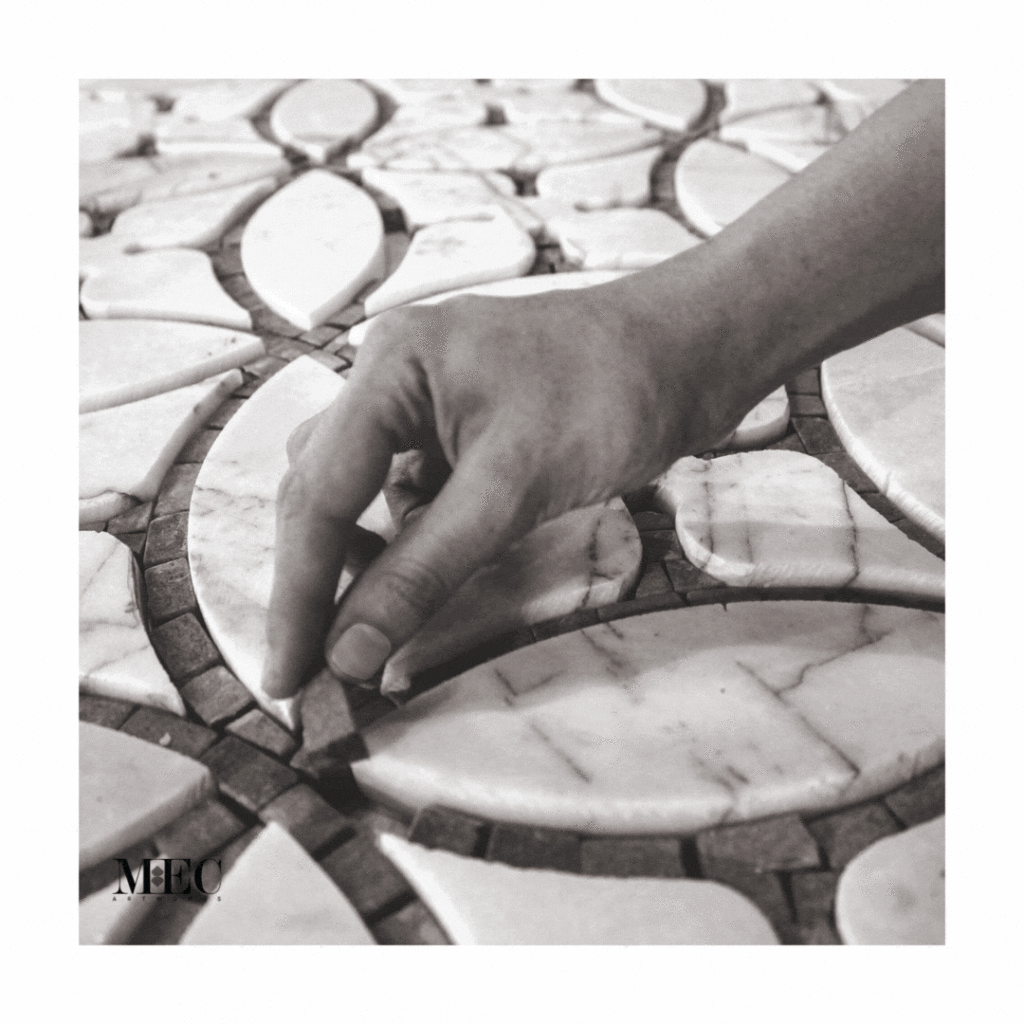
Why Emotion Is the Invisible Thread That Connects Us to Art
Art has always served as a vessel for emotional expression. From cave paintings to digital installations, artists channel their inner worlds into tangible forms. The role of emotion in art is not just to beautify, but to communicate—to bridge the personal and the universal.
Take, for example, emotional art drawings that capture the raw essence of feeling through simple lines or fragmented figures. These images often resonate more than words because they bypass logic and speak directly to the emotional core. Whether it’s grief, joy, loneliness, or hope, emotion gives art its impact.
Art doesn’t just reflect emotion – it transfers it. When words fail, art speaks – and we listen with our hearts.
This deep connection reveals the powerful relationship between art and psychology. Artists often create not to impress, but to express. The psychology of art and creativity shows that art can serve as a release—a way to translate internal experiences into visual form. Especially when language falls short, creativity steps in as a form of silent communication.
Expressing emotions through art isn’t just a technique; it’s a process of self-discovery. People often find clarity, comfort, and healing through visual storytelling. And when the viewer engages, they bring their own emotional framework to the piece, creating a two-way emotional exchange.
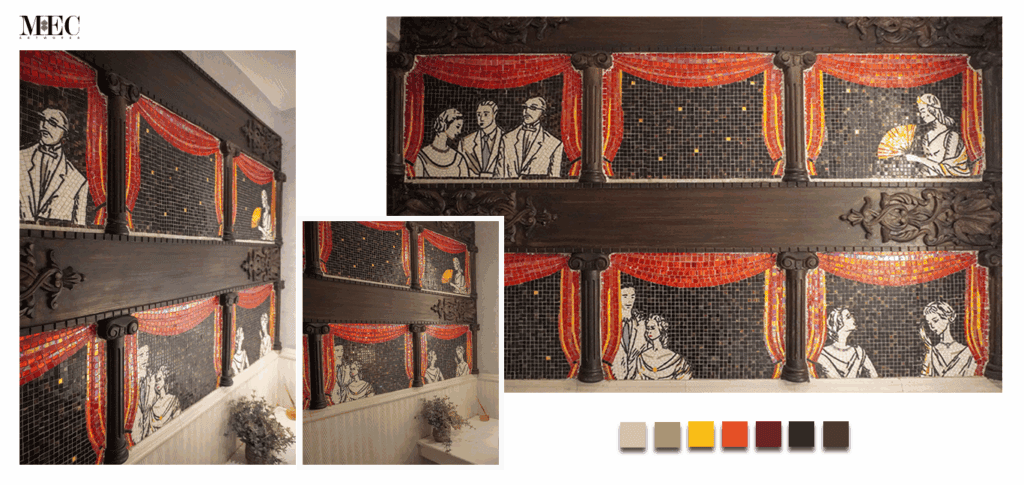
Some key aspects of how art engages emotion include:
- Nonverbal communication of complex feelings
- Symbolic representation of personal or collective experiences
- Catharsis through creation, especially in times of grief or change
- Emotional resonance that triggers memory or empathy
- Visual metaphors that express things words cannot
- Color and form used intentionally to evoke emotional responses
Over time, people form an emotional attachment to art, not just because of what it looks like, but because of how it makes them feel. The meaning behind this attachment can be deeply personal. It could stem from a connection to a memory, a person, or even a version of oneself that only that artwork seems to understand.
Real-life emotional attachment to art examples might include:
- A childhood painting that sparks nostalgia
- A portrait that reminds someone of a lost loved one
- A piece that reflects a personal struggle or triumph
- A simple sketch that once brought comfort during hard times
Some artworks focus specifically on human connection – the unspoken bond between individuals. These pieces often highlight touch, eye contact, or shared emotion. When art reflects relationships, it draws on the universal language of emotion and reminds us we’re not alone.
Art and emotion are inseparable. They fuel one another and allow us to experience both personal reflection and shared humanity through creative expression.
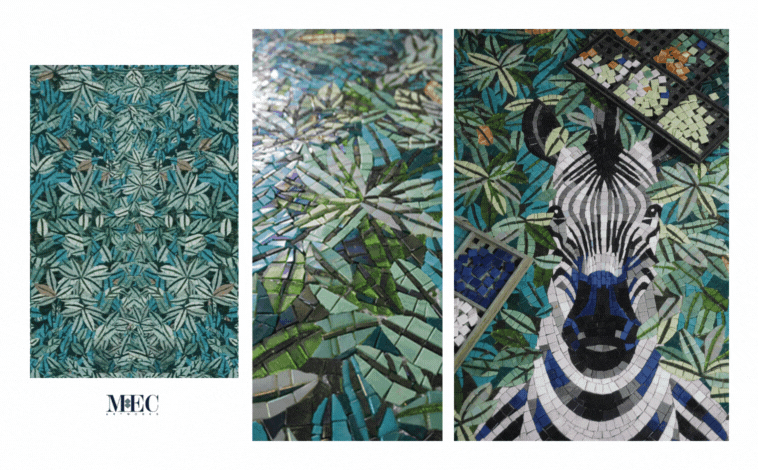
Our Creative Process at MEC Artworks
Every piece from MEC Artworks begins with your story. Whether you’re an interior designer, homeowner, or business owner, we collaborate closely with you.
Our process includes:
- Consultation: Understanding your space, style, and the emotional tone you wish to create.
- Conceptualization: Drafting color schemes, sketches, and layouts that align with your vision.
- Selection of Handmade Mosaic Tiles: Choosing from our diverse range of colors, textures, and materials.
- Craftsmanship: Our artists meticulously arrange each tile by hand, infusing every inch with care.
- Installation Support: Guiding clients or professionals through optimal installation techniques for longevity and beauty.
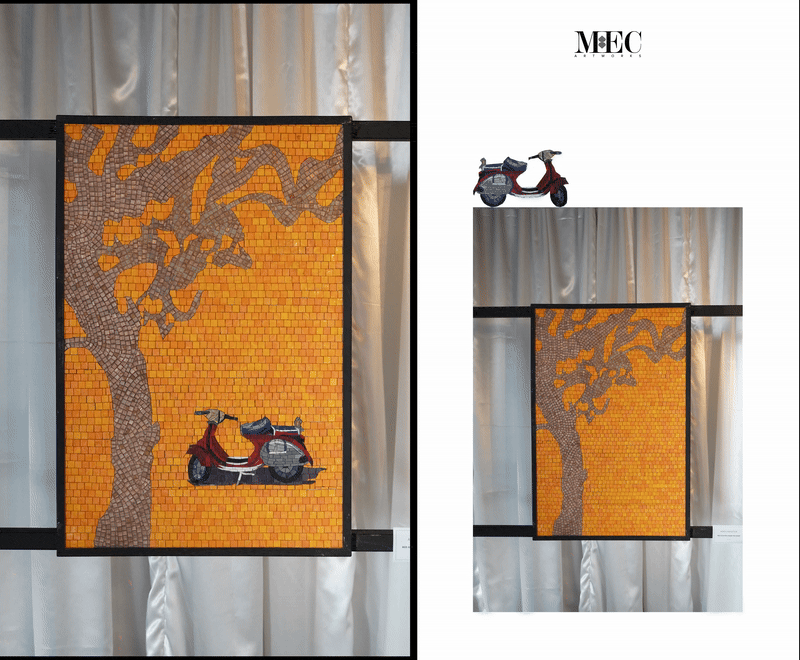
Why Designers Love Mosaic Art
Interior designers often look for pieces that combine beauty with story—and mosaic art offers both. It can be the defining element of a room or a subtle complement to broader design.
Designers love handmade mosaics because:
- They Bring Uniqueness to Each Project
No two mosaics are exactly alike. The subtle variations in tile shape, color, and placement ensure every piece is one-of-a-kind. - They Blend Art, Architecture, and Design Seamlessly
Mosaics act as the perfect bridge between artistic expression and functional space design, enhancing both form and function. - They Offer Timeless Beauty That Never Goes Out of Style
Unlike trends that fade, handmade mosaics have a classic appeal rooted in centuries of craftsmanship. - They Provide Endless Customization Options
Designers can tailor every detail—from color palettes to patterns—making mosaics fit perfectly with any concept. - They Add Texture and Depth to Spaces
Beyond color, mosaics introduce tactile dimension, enriching the sensory experience of interiors. - They Enhance Emotional Connection with Spaces
The handcrafted nature of mosaic artworks often evokes warmth and authenticity, making spaces feel more inviting. - They Are Durable and Long-Lasting
Handmade mosaic tiles are not only beautiful but also resilient, standing up to the demands of both residential and commercial use.
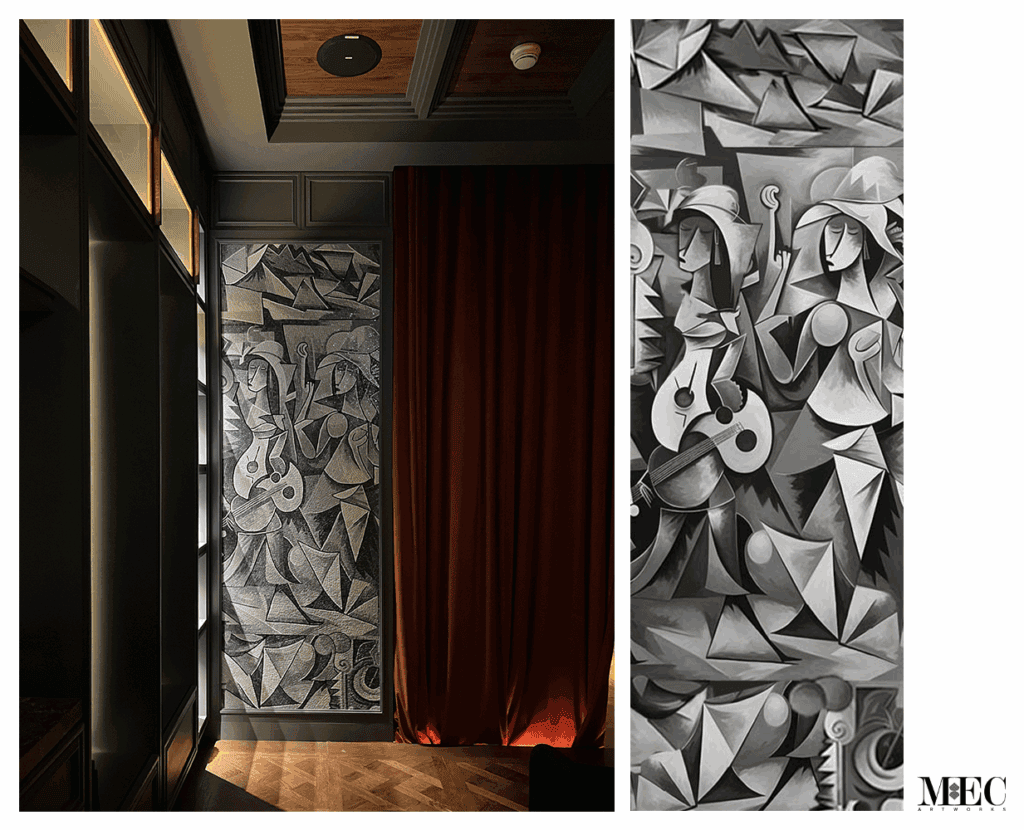
Mosaic Art and the Future of Interior Design
With sustainability and authenticity becoming more important in design, handmade mosaics are set to become even more relevant. They are eco-friendly, often using recycled materials, and provide clients with an alternative to soulless mass-produced options.
Moreover, the personalization trend means that people are more inclined to invest in meaningful pieces that reflect their identities. Mosaic art is an ideal medium for this, blending individuality, craftsmanship, and emotional storytelling.
Sustainability and the Handmade Ethos
Another emotional connection clients increasingly seek is sustainability. Handmade goods, including mosaics, symbolize conscious living. When you invest in a mosaic wall instead of disposable décor, you’re making an emotional and ethical decision.
MEC Artworks proudly embraces sustainable practices:
- Many of our handmade mosaic tiles use recycled materials.
- We source locally where possible to reduce carbon footprint.
- Our designs are timeless, reducing the need for frequent renovations.
There’s an emotional satisfaction in knowing your design choices contribute to a healthier planet. That feeling—of alignment between values and visuals—is another layer of connection that handmade mosaic art makes possible.
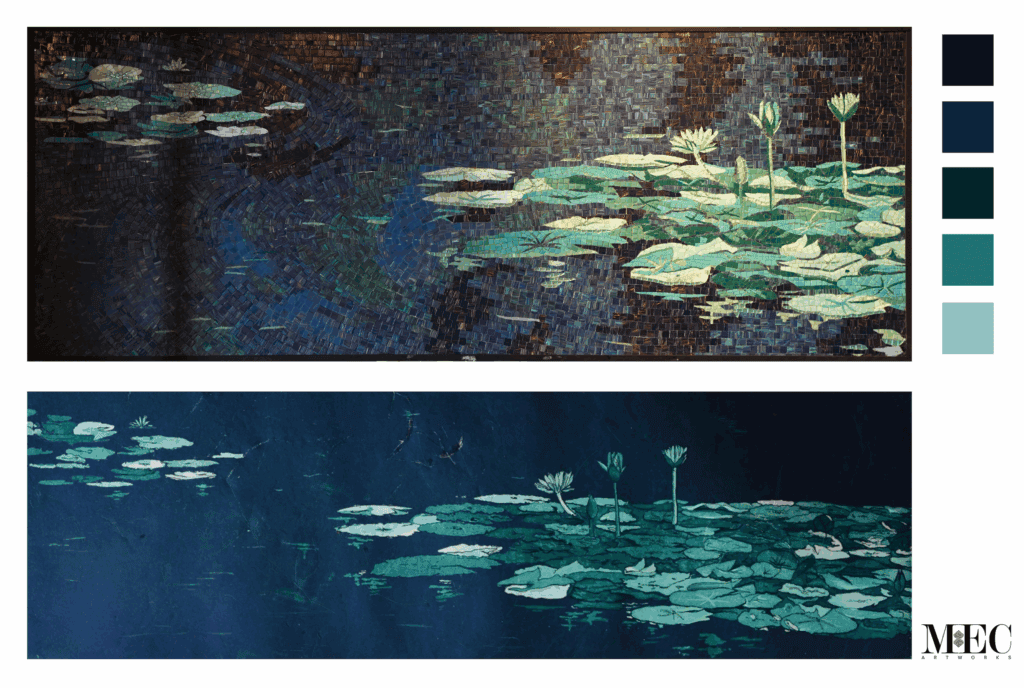
Turn Your Space Into a Story With Handmade Mosaics
In a world saturated with temporary trends, handmade mosaics offer something enduring—emotion. They bring together color, texture, pattern, and story in a way that no other art form can. Whether you’re looking for cool mosaic designs, stunning handmade mosaic flooring, or one-of-a-kind decorative mosaic art, the key is connection.
MEC Artworks is here to help you make that connection. With unmatched craftsmanship and personalized service, we’ll help you create a space that doesn’t just look amazing—it feels like home.
Ready to bring your story to life with mosaic art? Connect with MEC Artworks today!
FAQs
Why choose handmade tiles over mass-produced ones?
Handmade tiles offer authenticity, individuality, and a stronger sense of craftsmanship. Unlike mass-produced tiles, they often carry the artist’s mark and are made with sustainable, ethical practices, adding emotional and aesthetic value to any space.
How do I start creating my own mosaic tile art?
To start creating mosaic tile art, begin with a simple design, gather materials like ceramic or glass tiles, adhesive, and grout, and practice placing pieces on a board or small surface. Many find the process meditative and emotionally fulfilling, even as beginners.
What materials are used in handmade mosaic tiles?
Handmade mosaic tiles can be made from a variety of materials including ceramic, glass, stone, marble, and even recycled objects. Artists often select materials that reflect their aesthetic or cultural roots, adding emotional depth to each piece.
What’s the difference between mosaic art and other tile art forms?
Mosaic art involves placing many small pieces (tesserae) to form a larger image or pattern. Unlike painted or printed tiles, mosaic art is physically constructed piece by piece, making it more tactile and emotionally engaging.
How do artists choose colors in mosaic art?
Artists often choose colors based on mood, symbolism, and visual harmony. Warm tones might convey passion or energy, while cool tones can evoke calm or introspection—making color choice a key part of emotional expression.
